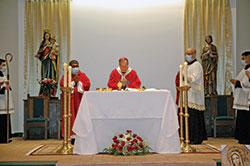Archbishop’s words and immigrants’ stories capture our shared humanity

Archbishop Charles C. Thompson celebrates Mass on Sept. 20 to mark National Migration Week at Our Lady of the Greenwood Church in Greenwood. Deacon Reynaldo Nava, left, and Father Tim DeCrane, associate pastor of Our Lady of the Greenwood Church, participated in the celebration of the liturgy. (Photo by John Shaughnessy)
By John Shaughnessy
GREENWOOD—As Archbishop Charles
C. Thompson celebrated a Mass on Sept. 20 to mark National Migration Week, nearly 7,000 Afghan refugees were just 26 miles away at Camp Atterbury, continuing their transition from fleeing their homeland to starting a new life in the United States.
And near the border in Texas, more than 14,000 migrants—from Haiti and other Central and South American countries—huddled under a bridge, desperate for food, shelter and hope.
These situations were among the ongoing realities that served as part of the backdrop for the archbishop’s homily at Our Lady of the Greenwood Church in Greenwood—a homily that focused on the Christian call to be in solidarity with one another, to reach out to the vulnerable, and to bring the light of Christ’s life into the darkness of the world.
“The plight of migrants and refugees is certainly an ongoing concern for individuals, families, communities and countries, involving multiples issues on a daily basis,” the archbishop said during the Mass which was celebrated in both English and Spanish.
The archbishop said the Church not only shares that concern, it strives to make a difference in the lives of migrants and refugees. And while that commitment is year-round, the archbishop noted, celebrating National Migration Week and the World Day of Migrants and Refugees on Sept. 26 “allows us to be intentional about our outreach to those in need, often some of the most vulnerable among us.
“Such intentionality is rooted in what it means to profess our belief in the one, holy, catholic and apostolic Church. Our profession of catholicity involves the belief that our Catholic faith transcends all bounds of ethnicity, culture and language.
“We are one people, a community of believers, called to live in solidarity with one another, respecting the dignity of every person, with a preferential option for the poor and vulnerable.”
‘To say thanks to God for this wonderful country’
As disciples of Jesus, Catholics need to be his light in the world today, “dispelling the darkness of injustice, violence, fear, despair and hopelessness,” the archbishop said.
With about half the people at the Mass from a Hispanic background, the archbishop shared the last part of his homily first in Spanish, then in English.
“Drawing inspiration from this eucharistic celebration, with grateful hearts may we appreciate our own blessings as the starting point in responding to the needs of others, particularly migrants and refugees,” he noted.
“It is from this place of gratitude and awareness that we are best able to accompany, dialogue and encounter one another with a sense of awe and wonder. Ultimately, it is the means of encountering and enabling others to encounter the person of Jesus Christ.”
The archbishop’s message—and the realities of life for Afghan refugees, Haitian migrants and other immigrants—hit close to home for Irene Tenorio.
After the Mass, she shared her story of leaving her home in Mexico when she was 15 and coming to the United States by herself.
“I’m an immigrant,” she said. “It means a lot to me to be here for this Mass—just to say thanks to God for this wonderful country. I didn’t come here because I wanted to. I came here because I needed to. I wanted to thank God because I’ve found here what I couldn’t find in my own country—education and work.”
She also said she has created a home here with her husband, Miguel, and their two children. It’s a life that includes involvement with her Our Lady of the Greenwood Parish, where she is a catechist in the Rite of Christian Initiation of Adults program.
“I always feel like I’m welcome here,” she said.
A reminder about our true home
Parishioners Jose and Claudia Gil also mentioned that connection of faith and home.
“We wanted to be here because this Mass is for the immigrants, and we are immigrants,” said Claudia, a native of Mexico. “We have 20 years in this country.”
The Gils and Tenorio were among a long line of people who waited patiently for a conversation and a blessing from the archbishop as he greeted them in the narthex of the church following the Mass.
As he shared that time with people from different backgrounds and circumstances, the archbishop’s words from early in the Mass about our shared humanity and purpose came to life:
“As we come together, we are reminded that we are all migrants, we are all refugees. This is not our final home. Our home is the kingdom of heaven.” †
